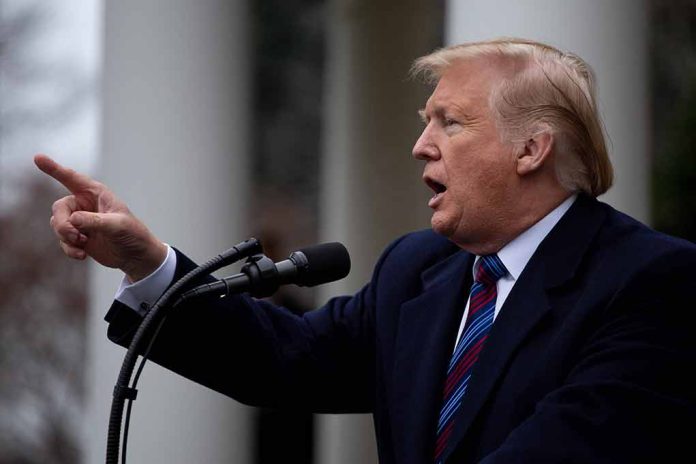
Congress passes a temporary funding bill, sidelining Trump’s SAVE Act and raising concerns about election security.
At a Glance
- House and Senate approve short-term funding bill to avert government shutdown
- Trump-backed SAVE Act for election security removed from final bill
- Funding extends until December 20, setting stage for another potential showdown
- Bill includes $231 million for Secret Service due to increased security needs
- Debate intensifies over election integrity and Republican Party priorities
Congress Approves Stopgap Measure, Averting Shutdown
In a move that has sparked intense debate across the political landscape, Congress has passed a temporary funding bill to keep the government running until December 20. The House of Representatives approved the measure with a vote of 341-82, followed by the Senate’s 78-18 vote. This bipartisan effort successfully averted an imminent government shutdown, but it came at the cost of excluding a crucial election security proposal championed by former President Donald Trump.
The bill, which now heads to President Joe Biden’s desk for signature, includes $231 million for the Secret Service, partly due to increased security needs. However, the most contentious aspect of this legislation is what it doesn’t include – the SAVE Act, a pivotal election security measure that would have mandated in-person verification of citizenship for voter registration and required states to purge non-citizens from voter rolls.
BREAKING: Senate passes funding bill without SAVE Act, avoiding potential shutdown https://t.co/RM3ZpvCxy5
— Fox News (@FoxNews) September 25, 2024
SAVE Act Omission Raises Election Security Concerns
House Speaker Mike Johnson’s decision to remove the SAVE Act from the bill has created a rift within the Republican Party. Johnson argued that pushing for a government shutdown before the election would be “political malpractice.” However, this move has left many conservatives feeling that a crucial opportunity to address election security concerns has been missed.
“I’m not defying President Trump. I’ve spoken with him at great length, and he is very frustrated about the situation. His concern is election security, and it is mine, as well. It is all of ours,” Johnson told reporters Tuesday.
The omission of the SAVE Act has intensified discussions about election integrity and the priorities of the Republican Party leadership. Some GOP members, like Representative Dan Bishop, opposed the bill, calling it “kicking the can down the road.” This sentiment echoes the frustrations of many conservatives who see election security as a paramount issue, especially with the upcoming presidential election.
House Passes Stopgap Funding Bill, Sending Measure to Senate
The continuing resolution does not include the SAVE Act, which would require proof of citizenship to register to vote.https://t.co/YYvCFz22A4
— The Epoch Times (@EpochTimes) September 25, 2024
Political Ramifications and Future Challenges
The passage of this stopgap measure sets the stage for another potential spending showdown in December. With both chambers of Congress set to adjourn until after the November 5 election, the debate over election security and government funding is far from over. Americans should remain vigilant as these critical issues continue to unfold in the coming months.
“There are two urgent priorities facing Congress right now: funding the government and securing the election. That’s why I was proud to vote last week for a bill that helped accomplish both goals. Unfortunately, it was defeated when nearly all House Democrats opposed a provision requiring a proof of citizenship to register to vote. How you could oppose ensuring the integrity of what may be the closest presidential race in modern history is beyond me. That’s why I voted against the bill when it was brought back to the House floor with the election protections stripped away. We’re facing what may be the closest presidential election in modern history, and I couldn’t justify voting for a bill that’s half as good and funds government for half as long as the one we brought to the floor last week. Southern Illinoisans deserve to have confidence that our elections are secure and that their vote won’t be canceled out by someone casting a ballot illegally.”
As the dust settles on this latest legislative battle, the focus now shifts to the upcoming election and the potential for further conflicts over government funding and election security. The temporary nature of this solution ensures that these issues will remain at the forefront of political discourse in the weeks and months to come.
Sources:
- Congress passes bill to avert a shutdown before the election, sending it to Biden
- Congress votes to avert shutdown, setting up chaotic funding fight in December
- Speaker Johnson announces plan to keep the government funded until Dec. 20
- BOST VOTES AGAINST SPENDING BILL WITHOUT ELECTION SECURITY REFORMS
- Mike Johnson defies Trump to pass spending bill without voting provisions
- House Speaker Johnson axes Trump voting restrictions in new government funding bill
- US Congress passes government funding package to avert shutdown






